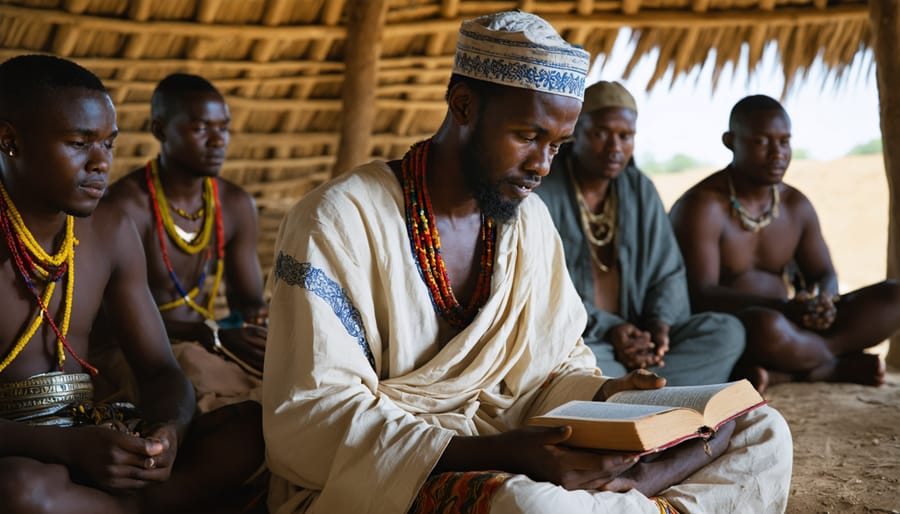Effective cross-cultural missionary training transforms passionate believers into culturally intelligent ambassadors for Christ. As the global church expands, the need for missionaries who excel at sharing God’s love across cultures has never been more critical. Modern missionary preparation requires a delicate balance of theological grounding, cultural sensitivity, and practical skills development.
The journey of cross-cultural ministry begins with humble recognition that God’s kingdom encompasses every tribe, tongue, and nation (Revelation 7:9). Today’s missionaries must navigate complex cultural landscapes while maintaining authentic Christian witness. This requires intentional preparation that goes beyond traditional Bible study to include cultural immersion, language acquisition, and deep understanding of indigenous worldviews.
Whether serving in remote villages or urban centers, missionaries need comprehensive training that equips them to build bridges between their faith and local customs. This preparation honors both the unchanging truth of the Gospel and the beautiful diversity of God’s creation, enabling missionaries to serve effectively as Christ’s representatives in any cultural context.

Building Cultural Intelligence for Effective Ministry
Understanding Cultural Values and Worldviews
Understanding different cultural values and worldviews is fundamental to effective cross-cultural ministry. As missionaries, we must approach each culture with humility and a genuine desire to learn, recognizing that God’s truth can be expressed through various cultural lenses while remaining faithful to Scripture.
Cultural values shape how people view relationships, time, spirituality, and community. For instance, while Western cultures often emphasize individualism, many Eastern and African cultures prioritize collective harmony and community relationships. These differences significantly impact how the Gospel message is received and understood.
The Apostle Paul demonstrated this cultural sensitivity in his ministry: “I have become all things to all people so that by all possible means I might save some” (1 Corinthians 9:22). This doesn’t mean compromising biblical truth, but rather presenting it in culturally relevant ways.
Key aspects to consider include:
– Communication styles (direct vs. indirect)
– Decision-making processes
– Views on authority and leadership
– Concept of time and planning
– Family structures and relationships
– Religious background and beliefs
By taking time to understand these cultural dimensions, missionaries can build meaningful relationships and share God’s love more effectively. This understanding helps prevent unintentional offense and creates bridges for sharing the Gospel in ways that resonate with local communities while maintaining biblical integrity.
Developing Cross-Cultural Communication Skills
Effective cross-cultural communication goes beyond mere language proficiency; it requires a heart of humility and genuine love for others, as demonstrated in 1 Corinthians 13:1: “If I speak in the tongues of men or of angels, but do not have love, I am only a resounding gong or a clanging cymbal.”
To develop strong cross-cultural communication skills, missionaries should first practice active listening with cultural sensitivity. This means paying attention not only to words but also to non-verbal cues, tone, and context. Understanding cultural values, traditions, and social hierarchies helps prevent unintentional misunderstandings or offense.
Learning to ask appropriate questions and seeking clarification respectfully is essential. Different cultures have varying communication styles – some may be more direct, while others prefer indirect communication. Missionaries should adapt their approach accordingly while maintaining authenticity in their message.
Non-verbal communication plays a crucial role across cultures. Simple gestures, eye contact, personal space, and even silence carry different meanings in various cultural contexts. Taking time to learn these nuances demonstrates respect and commitment to meaningful connection.
Above all, approach cross-cultural communication with patience, grace, and cultural humility. Remember that effective communication is a two-way process that requires ongoing learning and adaptation. As Philippians 2:3-4 teaches, “Do nothing out of selfish ambition or vain conceit. Rather, in humility value others above yourselves, not looking to your own interests but each of you to the interests of the others.”
Spiritual Preparation for Cross-Cultural Ministry
Strengthening Your Biblical Foundation
A strong biblical foundation is essential for effective cross-cultural ministry. Understanding the biblical cultural context helps missionaries bridge gaps between different worldviews while remaining faithful to Scripture’s teachings.
The Great Commission in Matthew 28:19-20 provides our primary mandate: “Go therefore and make disciples of all nations.” This command demonstrates God’s heart for all peoples and cultures. Acts 1:8 further emphasizes this global vision, calling believers to be witnesses “to the ends of the earth.”
Scripture offers numerous examples of cross-cultural ministry. Consider Paul’s approach in Acts 17, where he engaged with the Athenians by understanding their culture while boldly presenting the Gospel. His declaration in 1 Corinthians 9:22 about becoming “all things to all people” illustrates the importance of cultural adaptation without compromising biblical truth.
Key biblical principles for cross-cultural ministry include:
– Demonstrating Christ-like humility (Philippians 2:5-8)
– Showing genuine love for all people (1 John 4:7-8)
– Respecting cultural differences (1 Corinthians 10:32-33)
– Maintaining unity in diversity (Galatians 3:28)
– Exercising cultural sensitivity (1 Corinthians 10:23-24)
Regular Bible study and prayer are vital for maintaining spiritual strength while serving in unfamiliar environments. These practices help missionaries stay grounded in truth while navigating cultural challenges. Remember Jesus’s promise in Matthew 28:20: “And behold, I am with you always, to the end of the age.”

Developing Cultural Humility
Cultural humility stands as a cornerstone of effective cross-cultural ministry, rooted in the example of Jesus who, though divine, humbled Himself to serve humanity. As missionaries, we are called to approach new cultures with a teachable spirit, recognizing that God’s wisdom flows through diverse cultural expressions and traditions.
Developing cultural humility begins with acknowledging our own cultural biases and limitations. This involves prayerful self-reflection and a willingness to learn from those we serve. As the Apostle Paul demonstrated in his ministry, becoming “all things to all people” (1 Corinthians 9:22) requires us to set aside our cultural preferences and embrace the beauty of God’s diverse creation.
Practical steps toward cultural humility include:
– Learning the local language with patience and dedication
– Participating in community traditions with respect and genuine interest
– Seeking guidance from local believers and church leaders
– Listening more than speaking, especially in the early stages
– Accepting correction graciously when cultural mistakes occur
Remember that cultural humility is not about diminishing your own identity but about creating space for God to work through cultural differences. Jesus consistently demonstrated respect for local customs while maintaining His divine purpose. Similarly, missionaries should strive to honor local traditions while staying true to biblical principles.
Through cultural humility, we build trust and create authentic relationships that serve as bridges for sharing the Gospel. As we decrease our cultural pride, Christ increases in our ministry, allowing His love to transcend cultural boundaries and touch hearts in meaningful ways.
Practical Skills for Mission Field Success

Language Acquisition Strategies
Language acquisition is a crucial component of effective cross-cultural ministry, as it opens doors to deeper relationships and more meaningful Gospel sharing. Learning a new language requires dedication, humility, and a systematic approach that honors both the language and its speakers. As the Apostle Paul demonstrated in his ministry to various cultures, becoming “all things to all people” (1 Corinthians 9:22) includes embracing their means of communication.
Successful language learning begins with immersion and consistent practice. Missionaries are encouraged to live with host families when possible, actively participate in local community activities, and engage in daily conversations with native speakers. This approach not only accelerates language acquisition but also provides valuable cultural insights.
Effective strategies include:
– Setting realistic daily study goals
– Using language learning apps and resources
– Practicing with native speakers
– Keeping a vocabulary journal
– Recording and listening to conversations
– Learning through cultural activities and celebrations
– Studying Scripture in the target language
It’s important to remember that language learning is often a humbling experience. Mistakes and misunderstandings are natural parts of the process, and maintaining a teachable spirit is essential. Many missionaries find that their willingness to learn the local language demonstrates respect and builds trust with the community they serve.
Prayer should accompany language study, asking for God’s wisdom and guidance in this vital aspect of ministry preparation. As described in Acts 2, the Holy Spirit enabled the disciples to communicate God’s message effectively across language barriers, reminding us that language acquisition is both a practical skill and a spiritual endeavor.
Cultural Adaptation Techniques
Successfully adapting to a new cultural environment requires both practical skills and a Christ-centered mindset. As Jesus demonstrated sensitivity to different people He encountered, missionaries must develop cultural intelligence while maintaining their spiritual foundation.
One essential technique is practicing active observation without judgment. Take time to watch how locals interact, communicate, and conduct daily activities. Remember that God created diversity for His glory, as Scripture tells us in Revelation 7:9, describing “a great multitude from every nation, tribe, people and language.”
Language acquisition is another crucial component. While formal study is important, immersion through community engagement often proves most effective. Participate in local activities, attend community gatherings, and build relationships with native speakers. This approach not only improves language skills but also demonstrates genuine interest in the culture.
Cultural mentorship plays a vital role in adaptation. Seek guidance from experienced missionaries or local believers who can provide insights into cultural nuances, customs, and appropriate behavior. They can help navigate potential misunderstandings and offer wisdom gained through experience.
Developing flexibility in communication styles is essential. Learn to recognize and adapt to different approaches to time management, personal space, and social hierarchies. Practice active listening and be willing to adjust your communication methods to better serve your host community.
Remember that adaptation is a gradual process that requires patience and grace. As Paul wrote in 1 Corinthians 9:22, “I have become all things to all people so that by all possible means I might save some.” This principle guides us in finding the balance between maintaining our Christian identity while respectfully engaging with different cultures.
Building Sustainable Relationships
Building sustainable relationships across cultural boundaries requires patience, humility, and a Christ-centered approach. As missionaries, we’re called not just to share the Gospel but to create lasting connections that reflect God’s love for all people. Success in cross-cultural ministry often hinges on our ability to develop and maintain genuine relationships with those we serve.
The foundation of building meaningful relationships starts with genuine respect and cultural sensitivity. This means taking time to learn local customs, understanding social hierarchies, and showing sincere interest in the community’s traditions and values. As Paul wrote in 1 Corinthians 9:22, “I have become all things to all people so that by all possible means I might save some.”
Key practices for fostering sustainable relationships include:
– Active listening without judgment
– Learning and using local language whenever possible
– Participating in community events and celebrations
– Showing respect for local leadership
– Being consistent and reliable in commitments
– Demonstrating cultural humility
Remember that building trust takes time and cannot be rushed. Focus on developing authentic connections rather than achieving quick results. Share life together through both joys and challenges, allowing natural opportunities for ministry to emerge through these relationships. When we approach cross-cultural relationships with patience and genuine love, we create a foundation for lasting impact that honors both God and the communities we serve.
Cross-cultural missionary training is not merely a destination but a lifelong journey of growth, learning, and spiritual transformation. As we’ve explored the various ways missionaries serve across different cultures, it’s clear that cultural competency requires continuous dedication and an open heart to God’s leading.
Remember that even after completing formal training, every interaction in the mission field presents an opportunity to learn and grow. The Holy Spirit continues to shape and refine us as we serve, often in unexpected ways. As Paul reminded the Philippians, “Being confident of this, that he who began a good work in you will carry it on to completion until the day of Christ Jesus” (Philippians 1:6).
Stay humble and receptive to the lessons that come through daily interactions with people from different cultural backgrounds. Embrace the challenges as opportunities for spiritual growth, and maintain a posture of learning rather than assuming you have all the answers. Keep in regular prayer and reflection, asking God to reveal areas where you can grow in cultural understanding and sensitivity.
Above all, trust in God’s perfect timing and guidance throughout your missionary journey. He who has called you will equip you for the work He has prepared. Let your training be guided by both practical wisdom and the Holy Spirit’s leading, knowing that God’s grace is sufficient for every cultural bridge you’re called to cross.
